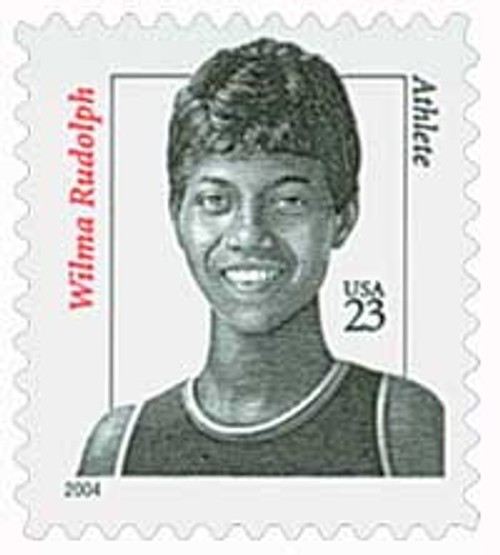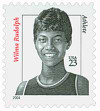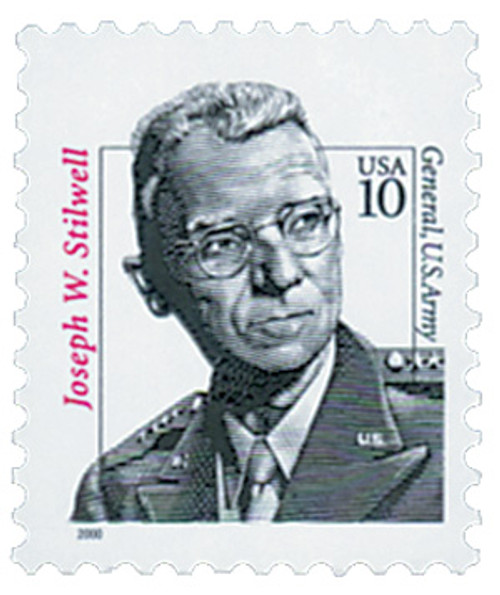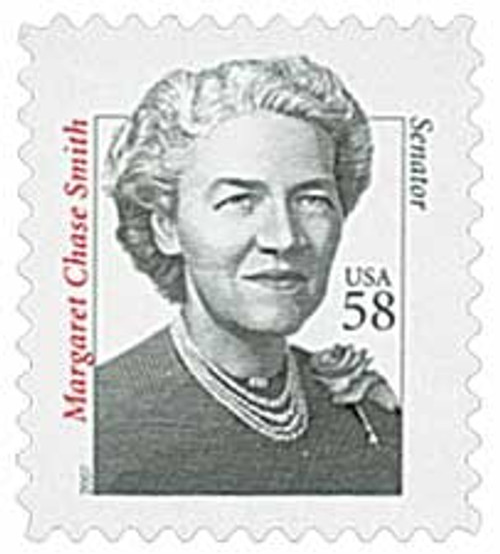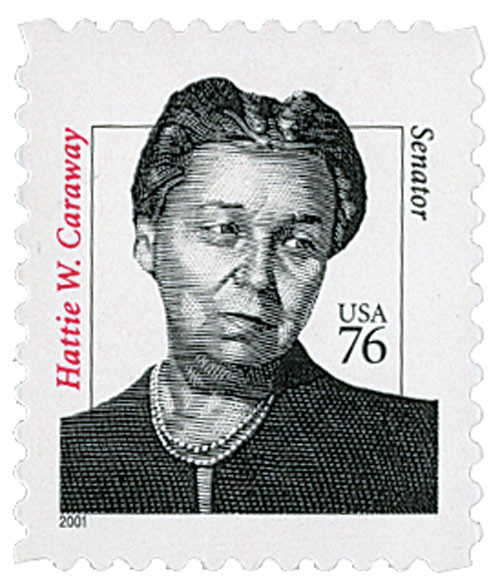
# 3422 - 2004 23c Distinguished Americans: Wilma Rudolph
23¢ Wilma Rudolph
Distinguished Americans Series
Booklet
City: Sacramento, CA
Printing Method: Lithographed
Perforations: Serpentine Die Cut 11 ¼ x 10 ¾
Color: Red and black
Birth of Wilma Rudolph
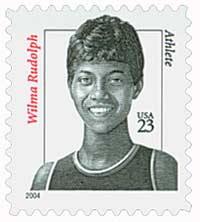
Wilma Glodean Rudolph was born on June 23, 1940, in Saint Bethlehem, Tennessee. Dubbed “The Fastest Woman in History,” she became the first female athlete to win three gold medals in a single Olympic Games.
Rudolph was the 20th of 22 children and suffered from pneumonia and scarlet fever when she was young. She contracted polio when she was five years old, and though she recovered, her left leg and foot were severely weakened. She would wear a leg brace for most of her childhood. Her family was determined to help her make a full recovery. So, her mother took her to Nashville every week for medical treatments and her family massaged her leg. By the time she was 12, Rudolph no longer needed the leg brace.
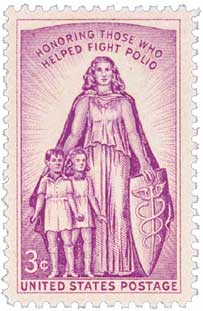
Rudolph started playing basketball on the school team when she was in eighth grade. By the time she was in high school, she was a starter on the team and started running track in between basketball seasons. Rudolph scored a record 803 points for the basketball team during her sophomore year. That same year she participated in her first major track event at Alabama’s Tuskegee Institute. When she was 14, she joined the summer training program at Tennessee State University. After that training, she won all nine events that she ran in the Amateur Athletic Union (AAU) track meet. She would run several amateur races with for the college’s team while still in high school. After graduation, she studied at Tennessee State University, earning a degree in education.
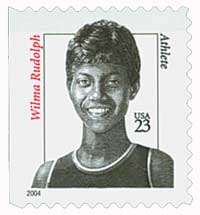
Rudolph participated in her first Olympic Games in 1956, while she was just 16 and a junior in high school. She qualified for the 200-meter individual event and was the youngest member on that year’s Olympic team. Though she lost the 200-meter race, her team in the 4 × 100 m relay earned the bronze medal. After her experience in those games, Rudolph was determined to win gold at the next Olympics in 1960 in Rome, Italy.
Rudolph spent the next four years training, entering college, and competing. She won silver in the individual 100-meter event and gold in the 4 × 100 m relay at the 1959 Pan American Games. She also won the 200-meter title race for the AAU five years in a row as well as three AAU indoor titles.
During Olympic trials for the 1960 games, Rudolph set a world record for the 200-meter dash that she held for eight years. She participated in three events at the 1960 Olympics – the 100- and 200-meter sprints, and the 4 × 100 m relay. Rudolph won gold in all three events, becoming the first American woman to do so in a single Olympic Games. She soon became known as “The Tornado, the fastest woman on earth.” She was also called “the fastest woman in history,” “the Black Gazelle,” “The Black Pearl,” and “La Chattanooga-Choo-Choo.”

Rudolph became an international star and was honored with a city-wide celebration when she returned home. At her insistence, it was the first fully integrated event in the city’s history. Rudolph continued to compete for a time and retired from racing when she was 22. At that time, she held several world records. She spent some time as a good will ambassador for the US State Department. She spent her post-Olympic years teaching elementary school, coaching track teams, and working with nonprofit organizations. Rudolph also hosted her owl local television show, started a foundation to train athletes, and lit the cauldron at the 1987 Pan American Games.

In the 1990s, Rudolph was diagnosed with brain and throat cancer. Her health declined quickly, and she died on November 12, 1994. Her life story has been retold through numerous documentaries, films, and books. In addition to the numerous awards, she received during her lifetime, Rudolph has been inducted into several halls of fame and has had streets and buildings named in her honor.
23¢ Wilma Rudolph
Distinguished Americans Series
Booklet
City: Sacramento, CA
Printing Method: Lithographed
Perforations: Serpentine Die Cut 11 ¼ x 10 ¾
Color: Red and black
Birth of Wilma Rudolph

Wilma Glodean Rudolph was born on June 23, 1940, in Saint Bethlehem, Tennessee. Dubbed “The Fastest Woman in History,” she became the first female athlete to win three gold medals in a single Olympic Games.
Rudolph was the 20th of 22 children and suffered from pneumonia and scarlet fever when she was young. She contracted polio when she was five years old, and though she recovered, her left leg and foot were severely weakened. She would wear a leg brace for most of her childhood. Her family was determined to help her make a full recovery. So, her mother took her to Nashville every week for medical treatments and her family massaged her leg. By the time she was 12, Rudolph no longer needed the leg brace.

Rudolph started playing basketball on the school team when she was in eighth grade. By the time she was in high school, she was a starter on the team and started running track in between basketball seasons. Rudolph scored a record 803 points for the basketball team during her sophomore year. That same year she participated in her first major track event at Alabama’s Tuskegee Institute. When she was 14, she joined the summer training program at Tennessee State University. After that training, she won all nine events that she ran in the Amateur Athletic Union (AAU) track meet. She would run several amateur races with for the college’s team while still in high school. After graduation, she studied at Tennessee State University, earning a degree in education.

Rudolph participated in her first Olympic Games in 1956, while she was just 16 and a junior in high school. She qualified for the 200-meter individual event and was the youngest member on that year’s Olympic team. Though she lost the 200-meter race, her team in the 4 × 100 m relay earned the bronze medal. After her experience in those games, Rudolph was determined to win gold at the next Olympics in 1960 in Rome, Italy.
Rudolph spent the next four years training, entering college, and competing. She won silver in the individual 100-meter event and gold in the 4 × 100 m relay at the 1959 Pan American Games. She also won the 200-meter title race for the AAU five years in a row as well as three AAU indoor titles.
During Olympic trials for the 1960 games, Rudolph set a world record for the 200-meter dash that she held for eight years. She participated in three events at the 1960 Olympics – the 100- and 200-meter sprints, and the 4 × 100 m relay. Rudolph won gold in all three events, becoming the first American woman to do so in a single Olympic Games. She soon became known as “The Tornado, the fastest woman on earth.” She was also called “the fastest woman in history,” “the Black Gazelle,” “The Black Pearl,” and “La Chattanooga-Choo-Choo.”

Rudolph became an international star and was honored with a city-wide celebration when she returned home. At her insistence, it was the first fully integrated event in the city’s history. Rudolph continued to compete for a time and retired from racing when she was 22. At that time, she held several world records. She spent some time as a good will ambassador for the US State Department. She spent her post-Olympic years teaching elementary school, coaching track teams, and working with nonprofit organizations. Rudolph also hosted her owl local television show, started a foundation to train athletes, and lit the cauldron at the 1987 Pan American Games.

In the 1990s, Rudolph was diagnosed with brain and throat cancer. Her health declined quickly, and she died on November 12, 1994. Her life story has been retold through numerous documentaries, films, and books. In addition to the numerous awards, she received during her lifetime, Rudolph has been inducted into several halls of fame and has had streets and buildings named in her honor.

